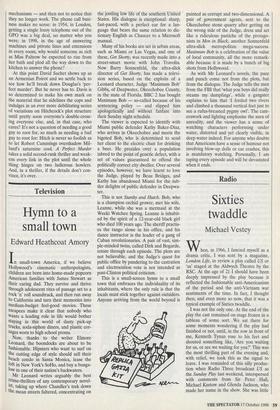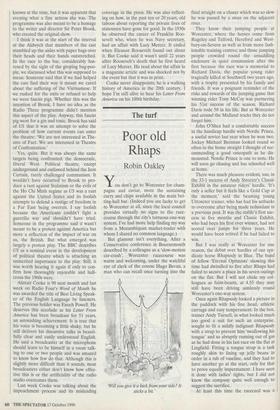Radio
Sixties twaddle
Michael Vestey
When, in 1966, I fancied myself as a drama critic, I was sent by a magazine, London Life, to review a play called US or `us' staged at the Aldwych Theatre by the RSC. At the age of 21 I should have been deeply impressed by the play because it reflected the fashionable anti-Americanism of the period and the anti-Vietnam war sentiments of the time. In fact, I thought then, and even more so now, that it was ,a typical example of Sixties twaddle.
I was not the only one. At the end of the play the cast remained on stage frozen in a tableau of some sort. We sat there for some moments wondering if the play had finished or not, until, in the row in front of me, Kenneth Tynan rose to his feet and shouted something like, 'Axe you waiting for us, or are we waiting for you?' This was the most thrilling part of the evening and, with relief, we took this as the signal to leave. I was reminded of this silly produc- tion when Radio Three broadcast US as the Sunday Play last weekend, interspersed with comments from Sir Peter Hall, Michael Kustow and Glenda Jackson, who made her name in the show. She was little known at the time, but it was apparent that evening what a fine actress she was. The programme was also meant to be a homage to the writer and director Sir Peter Brook, who created the original show.
I think it was at the start of the interval at the Aldwych that members of the cast stumbled up the aisles with paper bags over their heads and their hands outstretched. In the race to the bar, considerably has- tened by the sight of the groping bag-peo- ple, we discussed what this was supposed to mean. Someone said that if we had helped the cast find their way it meant we cared about the suffering of the Vietnamese. If we rushed for the exits or refused to help we were fascist pigs. Whether this was the intention of Brook, I have no idea as the Radio Three programme didn't mention this aspect of the play. Anyway, this fascist pig went for a gin and tonic. Brook has said of US that it was an attempt to solve the problem of how current events can enter the theatre: 'We are not interested in The- atre of Fact. We are interested in Theatre of Confrontation.'
Yes, quite. But it was always the same targets being confronted: the democratic, liberal West. Political theatre, except underground and outlawed behind the Iron Curtain, rarely challenged communism. It wouldn't have occurred to Brook to pro- duce a rant against Stalinism or the evils of the Ho Chi Minh regime as US was a rant against the United States and its foolish attempts to defend a vestige of freedom in a Far East being overrun. I say foolish because the Americans couldn't fight a guerrilla war and shouldn't have tried. Someone in the programme said it wasn't meant to be a protest against America but more a reflection of the impact of war on us, the British. But what emerged was largely a protest play. The BBC describes US as a seminal event in the development of political theatre which is attaching an unmerited importance to the play. Still, it was worth hearing it again if only to con- firm how thoroughly enjoyable and ludi- crous the 1960s were.
Alistair Cooke is 90 next month and last week on Radio Four's Word of Mouth he was awarded the title of Best Living Speak- er of the English Language by listeners. The previous holder was Enoch Powell. He deserves this accolade as his Letter From America has been broadcast for 51 years, an astonishing achievement. It is true that his voice is becoming a little shaky, but he still delivers his discursive talks in beauti- fully clear and easily understood English. He said a broadcaster at the microphone should learn to be himself in a room talk- ing to one or two people and was amazed to know how few do that. Although this is slightly more difficult than it sounds, most broadcasters either don't know how effec- tive this is or the artificiality of the radio studio overcomes them.
Last week Cooke was talking about the impeachment process and its misleading coverage in the press. He was also reflect- ing on how, in the past ten or 20 years, old taboos about reporting the private lives of statesmen have gone for good. In the 1930s he observed the career of Franklin Roo- sevelt who, when he was Navy secretary, had an affair with Lucy Mercer. It ended when Eleanor Roosevelt found out about it. But Cooke said it wasn't until 22 years after Roosevelt's death that he first heard of Lucy Mercer. He read about the affair in a magazine article and was shocked not by the event but that it was in print.
Cooke never disappoints; he is a walking history of America in the 20th century. I hope I'm still alive to hear his Letter From America on his 100th birthday.











































































 Previous page
Previous page